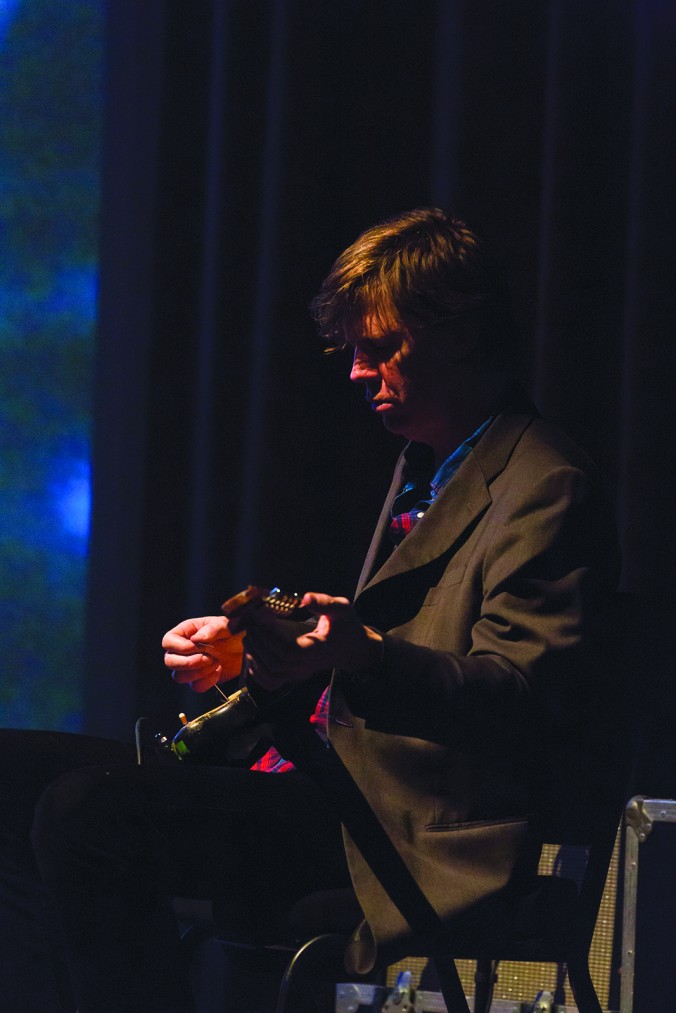A Conversation With Thurston Moore

Street, a video by artist James Nares, is 61 minutes of slow-motion movement among New York City’s street life — from one end of the boroughs to the other. Through his narrative, Nares captures the curious beauty of everyday moments. On March 13, the Art Institute of Chicago screened the film with the accompaniment of a musical score played live by Thurston Moore on a 12-string guitar. Though the street life in a mega-city can at times be out of the ordinary, the film’s series of pan shots (reminiscent of Koyaanisqatsi’s slow-mo footage of cities across the U.S. with a score by Phillip Glass) somehow strikes a deep emotional chord. Moore’s composition marries sound with images for a work that is pregnant alternately with vague anxiety and self-reflexive esprit de corps. Before the show Moore took a moment to answer a few questions.
TP: What’s the origin story of your collaboration with James Nares?
TM: I knew of James’ work since I first moved to NYC in 1976. We met around 2006 when I was working on publishing a book on the No Wave music movement of NYC with co-author Byron Coley. We interviewed James at length, and both he and I remained friends with shared ideas in expression — in music and art. While James was editing and reviewing his footage for Street he asked if I’d be interested in scoring. Of course I was. I had been an enthusiast of his film work and painting (and his guitar playing in The Contortions in the 1970s), so to be involved with collaboration with this man was extremely exciting. I lent him some recordings I had recently been involved with, and one of them was a series of 12-string acoustic guitar improvisations, which resonated with him the most.
TP: How did you go about interpreting Street through a musical score? Do you reinterpret it at each screening, or have you composed a score that you stick to?
TM: I sat down in front of my laptop and while watching his footage created a new 12-string piece in real time, more or less, to the film and sent it to him to reference. This turned out to be the actual soundtrack, which was challenging, as it is only recorded by a tiny laptop microphone but James employed a sound engineer who did great work “sweetening” the recording.
TP: Would you ever cross into filmmaking? If you could make a film, about anything what would it be?
TM: Filmmaking seems to be daunting only because of the expense involved, but I do realize great film work can be made, as artistic expression, with inexpensive digital media and perfectly alone. I prefer the sensuality of analogue tape when it comes to recorded documentation, so working in digital leaves me cold. I have made a few films on super-8 with other directors such as David Markey and Raymond Pettibon and have shot some footage of my own, also on Super 8, which I hoped to utilize in some forum. I’d love to make a film about the jazz musician Art Pepper, based on his book Straight Life, with James Chance in the lead role.
TP: What are your thoughts on the effects of the last ten years’ rapid technological advances on art and society in general?
TM: I find there is a veil between “real life” and “online life,” where the voices of the Internet are muted on the street. This creates a social psychology that is somewhat manifest in schizophrenic behavior, which I believe is inherent in everyone to some degree — the dualities of creation we all are attended by. In that sense I see the desire for rampant interactive technology as a reflection of presenting the human mind and condition. I do think it’s important to shut the lid on weekends — enjoy life, read books on paper, touch yourself and/or your lover/friend, share food and physical energy and art, deliver happiness.
TP: Can you talk about upcoming projects and your practice as an artist?
TM: I am in the process of recording a new record, due out in September, and I hope to be touring the USA with a band of musicians who will play under my name. I am also working on a few books of poetry, which is a vocation I’ve always been involved with along with music-making. I will teach, for the fourth year now, at Naropa University in their poetry summer writing workshop in Boulder, Colorado. Naropa is a school founded by Allen Ginsberg and Anne Waldman to further studies in literature with a mind informed by the beauty and experience of Buddhist philosophy.
TP: Oakland or Detroit? Caracas or Beijing?
TM: Oakland I love and can totally see living there — Bay area is nice. Detroit is hardcore and is definitely a great new frontier of post-apocalyptic romance, but I’d choose Oakland. I don’t even know where Caracas is, and Beijing is in China, and I LOVE China. But there are too many culture police with weapons.







